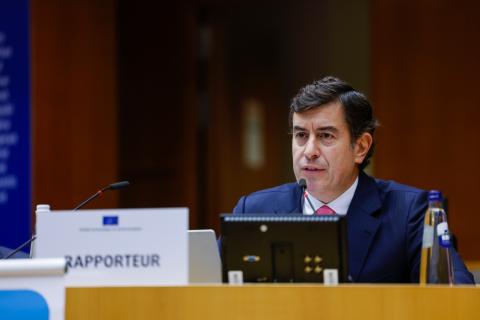European Economic
and Social Committee
Good communication with citizens must show the benefits of the European project
In an opinion adopted on 23 February, the EESC commented on the Commission's Communication on the 2023 Annual Sustainable Growth Survey, which outlines the economic and employment policy priorities for the EU for the coming 12 to 18 months. The Committee welcomed the priorities set regarding competitive sustainability, as well as the attention put on strengthening social dialogue in the EU. Furthermore, the EESC stresses the importance of good communication with citizens and calls on the Commission to invest in it. To improve the functioning of the single market, the EESC calls for fair working conditions, effective competition and better consideration of civil society concerns. The Committee also encourages Member States to adopt a realistic, moderate and balanced approach when addressing inflation.
The Annual Sustainable Growth Survey (ASGS) is presented by the Commission once a year and provides guiding principles for implementing them in the 2023 European Semester cycle – the annual cycle of EU economic, fiscal, labour and social policy coordination within the EU. Europe is going through its most difficult period in the last 70 years and the 2023 ASGS aims to mitigate the negative impact of energy shocks in the short term, fostering sustainable and inclusive growth and increasing the EU's economic and social resilience in the medium term. In particular, this Communication on the 2023 ASGS proposes that Member States pursue the EU policy objectives of the green and digital transitions, and is structured around the four dimensions of competitive sustainability: environmental sustainability, productivity, fairness and macroeconomic stability.
More and better communication
In its opinion, the EESC calls on the Commission to invest in better communication with citizens in order to promote greater awareness of the benefits of the European project.
A strong, reliable and common speech on the challenges and how the EU is mobilised to work to overcome them is fundamental for citizens, and it will avoid misunderstandings about the European project and would boost the idea of a Europe for all
, EESC rapporteur Gonçalo Lobo Xavier commented.
In this respect, the EESC welcomes the Commission's initiative this year to present a Communication on strengthening social dialogue in the EU and a proposal for a Council Recommendation on the role of social dialogue at national level. Better communication with and consultation of organised civil society are essential and go hand in hand.
Building fiscal buffers
The EESC believes that recent shocks underline the importance of closely coordinating sound fiscal policies and of building fiscal buffers during good times, while simultaneously addressing social deficits as they can compromise economic growth in the medium term. Fiscal policies should aim to achieve prudent medium-term fiscal positions and ensure fiscal sustainability through gradual consolidation and sustainable growth-enhancing investment and reforms.
Fighting inflation
The EESC calls for a moderate, realistic and balanced approach while addressing inflation in order to involve everyone in the search for a solution that will benefit the whole EU. The high level of inflation, triggered in particular by sharply rising energy prices, is having a very negative impact on workers and businesses, financial stability, purchasing power parity and economic and social stability. For vulnerable households, food and energy represent higher shares of their consumption baskets. Therefore, they should be supported in the short term to protect them from the worst effects of the crisis. In addition, the EESC is in favour of measures to coordinate energy prices in order to moderate inflationary tendencies and stresses that further initiatives might be necessary to ensure that sufficient private and public capital is mobilised for the energy and green transition. Moreover, the Committee encourages the ECB to lower core inflation without compromising the EU's economic recovery.
The EU also needs to balance the demand for energy supply and support measures that will boost efficiency in all areas. This must be done while preserving the integrity of the single market and ensuring macroeconomic financial stability and coherent fiscal and monetary policies. Moreover, the EESC stresses that problems can only be solved if governments, businesses and organised civil society work together. Member States must relentlessly focus on efficiency and fairness in using financial and other public resources available. Finally, the EESC believes that it is essential, before any extraordinary increase in EU resources for public investment and the promotion of private investment, that all existing resources in the various EU programmes be fully utilised and that the greatest possible degree of flexibility in their use – in terms of both objectives and implementation deadlines – be provided and always compatible with rigorous monitoring to ensure they are implemented properly.
